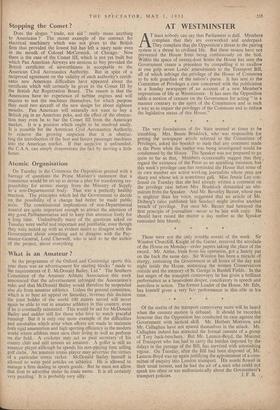T least nobody can say that Parliament is dull. Members
complain that they are overworked and underpaid.
They complain that the Opposition's threat to the pairing system is a threat to civilised life. But these moans have not prevented the House from being continuously on the boil. Within the space of twenty-four hours the House has seen the Government create a precedent by compelling it to swallow at one gulp seven Lords' amendments to the Transport Bill, all of which infringe the .privilege of the House of Commons to be sole guardian of the nation's purse.. It has sent to the Committee of Privileges a case concerned with the publication in a Sunday newspaper of an account of a new Member's impressions of life at Westminster. It has seen the Opposition table a motion of censure on the Government for acting " in a manner contrary to the spirit of the Constitution and in such a way as to impair the privilegps of the Commons and to reduce the legislative status,of this House."
The very foundations of the State seemed at times to bo trembling. Mrs. Bessie Braddock, who • was responsible for getting the newspaper article referred to the Committee of Privileges, asked the Speaker to state that any comment made in the Press while the matter was being investigated would be condemned by the House. The Speaker was not prepared to go quite so far as that. Members occasionally suggest that they regard the existence of the Press as an appalling nuisance, but this week's privilege case has reminded the House that some of its own number are active working journalists whose pens are sharp and whose ink is sometimes gall. Miss Jennie Lee con- fessed on Tuesday that she, had already written a comment on the privilege case before Mrs. Braddock demanded an ulti- matum frdm the Speaker. And Mr. Beverley Baxter, whose pen is mightier than his voice, suggested that an article of Mr. Driberg's (also published last Sunday) might involve another breach of privilege. For once Mr. Baxter had betrayed the first principle of journalism--never to be late with .copy. He. should have raised the matter a day earlier as the Speaker reminded him bluntly.
* * * * These were not the only notable events of the week. Sir Winston Churchill, Knight of the Garter, received the accolade of the House on Monday—order papers taking the place of the sword. Mr. Attlee, fresh from.his operation, got a hearty pat on the back the same day. Sir Winston has been a miracle of energy, sustaining the Government at all hours of the day and night inside the House, sustaining the women Conservatives outside and the memory of St. George in Bunhill Fields.. In the last stages of the transport controversy he has given a brilliant performance as a benevolent despot, conciliatory in speech and merciless in action. The former Leader of the House, Mr. Ede, has himself given a very fair performance in this role in his time.
* Of the merits of the transport controversy more will be heard when the censure motion is debated. It should be recorded however that the Opposition has conducted its case against the Government with tactical skill. 'Mr. Herbert Morrison and Mr. Callaghan have not spared themselves in the attack. Mr. Callaghan indeed has attracted the formal censure of a group of Tory back-benchers. But Mr. Lennox-Boyd, the Minister of Transport who has had to carry the burden imposed by the delays in the passage of the Bill, has survived with astonishing vigour. On Tuesday, after the Bill had been disposed of, Mr. Lennox-Boyd was up again justifying the appointment of a com- mittee of enquiry into London transport. His words flowed in their usual torrent, and he had the air of a. mail whd could not speak too often or too enthusiastically about the Government's


































 Previous page
Previous page